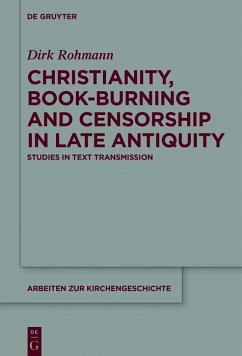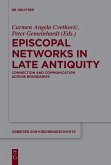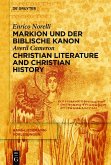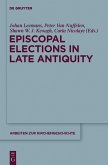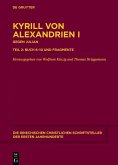It is estimated that only a small fraction, less than 1 per cent, of ancient literature has survived to the present day. The role of Christian authorities in the active suppression and destruction of books in Late Antiquity has received surprisingly little sustained consideration by academics. In an approach that presents evidence for the role played by Christian institutions, writers and saints, this book analyses a broad range of literary and legal sources, some of which have hitherto been little studied. Paying special attention to the problem of which genres and book types were likely to be targeted, the author argues that in addition to heretical, magical, astrological and anti-Christian books, other less obviously subversive categories of literature were also vulnerable to destruction, censorship or suppression through prohibition of the copying of manuscripts. These include texts from materialistic philosophical traditions, texts which were to become the basis for modern philosophy and science. This book examines how Christian authorities, theologians and ideologues suppressed ancient texts and associated ideas at a time of fundamental transformation in the late classical world.
Dieser Download kann aus rechtlichen Gründen nur mit Rechnungsadresse in A, B, BG, CY, CZ, D, DK, EW, E, FIN, F, GR, HR, H, IRL, I, LT, L, LR, M, NL, PL, P, R, S, SLO, SK ausgeliefert werden.
"[...] we need more conversation about the impact of book-burning and censorship in late Antiquity. He makes a reasonable case that each did play a role. This book is a must-read for those interested in ancient book culture."
Brian J. Wright, in: Religious Studies Review 43 (2017), 285, https://doi.org/10.1111/rsr.13133
"The thesis of this book is that, if a 'wide definition of censorship' is adopted (p. 301), Christian censorship did more injury to the classical tradition than we have been wont to imagine."
Mark J. Edwards, in: The Journal of Ecclesiastical History 68 (2017), 825-827, https://doi.org/10.1017/S0022046917001506
"[...] diese sehr gute Arbeit [sei] allen in irgendeiner Weise am Thema Spätantike Interessierten sehr empfohlen. Zahlreiche Texte christlicher Autoren (unter anderem längere Ausschnitte aus Heiligenviten) werden hier zum ersten Mal in englischer Übersetzung geboten, was sie für ein breiteres Publikum zugänglich macht. Dabei stehen jeweils die griechischen und lateinischen Originaltexte in den Fußnoten, so dass sich jeder Leser selbst ein Bild machen kann. Insgesamt handelt es sich um eine innovative Studie, die zum ersten Mal die Rolle der Religion für die Übermittlung der Texte in den Fokus stellt."
Balbina Bäbler in: Plekos 19, 2017, 493-498
"As Dirk Rohmann has written in his new book, Christianity, Book-Burning and Censorship in Late Antiquity, early Christians often spoke of books as a kind of body that demons could inhabit. What better way to kill these demons than to burn them?"
Sarah Bond, Top 5 Ancient And Medieval Censored Books To Read During Banned Book Week, in: forbes.com, 26/09/2016, http://www.forbes.com/sites/drsarahbond/2016/09/26/top-5-ancient-and-medieval-censored-books-to-read-during-banned-book-week/#26d244136a84
"Dirk Rohmanns Buch 'Christianity, Book-Burning and Censorship in Late Antiquity. Studies in Text Transmissions' leistet in vielem Pionierarbeit. ... Rohmann [erweist sich] als fundierter Kenner christlicher Schriftsteller und ihrer Auseinandersetzung mit heidnisch-philosophischen Ideen. ... Das Buch wird zweifelsohne als einschlägiges Werk zu Bücherverbrennungen und Zensur in der Spätantike in den nächsten Jahren von der Forschung herangezogen werden. Die Studie ist quellengesättigt, aber gleichzeitig gut lesbar, klar strukturiert und besticht durch ihre chronologische Breite von Diokletian bis Isidor von Sevilla."
Volker Menze: Rezension von: Dirk Rohmann: Christianity, Book-Burning and Censorship in Late Antiquity. Studies in Text Transmission, Berlin: de Gruyter 2016, in: sehepunkte 17 (2017), Nr. 1 [15.01.2017], URL: http://www.sehepunkte.de/2017/01/29253.html
"das Buch [bietet] auf einem wichtigen Sektor Einsichten in Transformationsaspekte, die auf den Anteil des Christentums an den Veränderungen in der Rezeption überkommener kultureller Grundlagen hinweisen und somit zum Ende der Antike beitragen."
Ulrich Lambrecht: Rezension zu: Rohmann, Dirk: Christianity, Book-Burning and Censorship in Late Antiquity. Studies in Text Transmission. Berlin 2016, in: H-Soz-Kult, 16.01.2017, www.hsozkult.de/publicationreview/id/rezbuecher-26616>.
"This is a fascinating study. Rohmann has provided students of Christianity one of the most engaging studies I have yet read. The topic is fascinating and the development of the subject is meticulous and wise. ... This book is literally packed with important historical details which fill in the gaps about an early Christian practice which raises eyebrows among those who may not know the whence and why of book burning."
Jim West: review of Dirk Rohmann: Christianity, Book-Burning and Censorship in Late Antiquity. Studies in Text Transmission, Berlin: de Gruyter 2016, in: Zwinglius Redivivus (biblioblog), 19/01/2017, https://zwingliusredivivus.wordpress.com/2017/01/19/christianity-book-burning-and-censorship-in-late-antiquity/
Brian J. Wright, in: Religious Studies Review 43 (2017), 285, https://doi.org/10.1111/rsr.13133
"The thesis of this book is that, if a 'wide definition of censorship' is adopted (p. 301), Christian censorship did more injury to the classical tradition than we have been wont to imagine."
Mark J. Edwards, in: The Journal of Ecclesiastical History 68 (2017), 825-827, https://doi.org/10.1017/S0022046917001506
"[...] diese sehr gute Arbeit [sei] allen in irgendeiner Weise am Thema Spätantike Interessierten sehr empfohlen. Zahlreiche Texte christlicher Autoren (unter anderem längere Ausschnitte aus Heiligenviten) werden hier zum ersten Mal in englischer Übersetzung geboten, was sie für ein breiteres Publikum zugänglich macht. Dabei stehen jeweils die griechischen und lateinischen Originaltexte in den Fußnoten, so dass sich jeder Leser selbst ein Bild machen kann. Insgesamt handelt es sich um eine innovative Studie, die zum ersten Mal die Rolle der Religion für die Übermittlung der Texte in den Fokus stellt."
Balbina Bäbler in: Plekos 19, 2017, 493-498
"As Dirk Rohmann has written in his new book, Christianity, Book-Burning and Censorship in Late Antiquity, early Christians often spoke of books as a kind of body that demons could inhabit. What better way to kill these demons than to burn them?"
Sarah Bond, Top 5 Ancient And Medieval Censored Books To Read During Banned Book Week, in: forbes.com, 26/09/2016, http://www.forbes.com/sites/drsarahbond/2016/09/26/top-5-ancient-and-medieval-censored-books-to-read-during-banned-book-week/#26d244136a84
"Dirk Rohmanns Buch 'Christianity, Book-Burning and Censorship in Late Antiquity. Studies in Text Transmissions' leistet in vielem Pionierarbeit. ... Rohmann [erweist sich] als fundierter Kenner christlicher Schriftsteller und ihrer Auseinandersetzung mit heidnisch-philosophischen Ideen. ... Das Buch wird zweifelsohne als einschlägiges Werk zu Bücherverbrennungen und Zensur in der Spätantike in den nächsten Jahren von der Forschung herangezogen werden. Die Studie ist quellengesättigt, aber gleichzeitig gut lesbar, klar strukturiert und besticht durch ihre chronologische Breite von Diokletian bis Isidor von Sevilla."
Volker Menze: Rezension von: Dirk Rohmann: Christianity, Book-Burning and Censorship in Late Antiquity. Studies in Text Transmission, Berlin: de Gruyter 2016, in: sehepunkte 17 (2017), Nr. 1 [15.01.2017], URL: http://www.sehepunkte.de/2017/01/29253.html
"das Buch [bietet] auf einem wichtigen Sektor Einsichten in Transformationsaspekte, die auf den Anteil des Christentums an den Veränderungen in der Rezeption überkommener kultureller Grundlagen hinweisen und somit zum Ende der Antike beitragen."
Ulrich Lambrecht: Rezension zu: Rohmann, Dirk: Christianity, Book-Burning and Censorship in Late Antiquity. Studies in Text Transmission. Berlin 2016, in: H-Soz-Kult, 16.01.2017, www.hsozkult.de/publicationreview/id/rezbuecher-26616>.
"This is a fascinating study. Rohmann has provided students of Christianity one of the most engaging studies I have yet read. The topic is fascinating and the development of the subject is meticulous and wise. ... This book is literally packed with important historical details which fill in the gaps about an early Christian practice which raises eyebrows among those who may not know the whence and why of book burning."
Jim West: review of Dirk Rohmann: Christianity, Book-Burning and Censorship in Late Antiquity. Studies in Text Transmission, Berlin: de Gruyter 2016, in: Zwinglius Redivivus (biblioblog), 19/01/2017, https://zwingliusredivivus.wordpress.com/2017/01/19/christianity-book-burning-and-censorship-in-late-antiquity/

